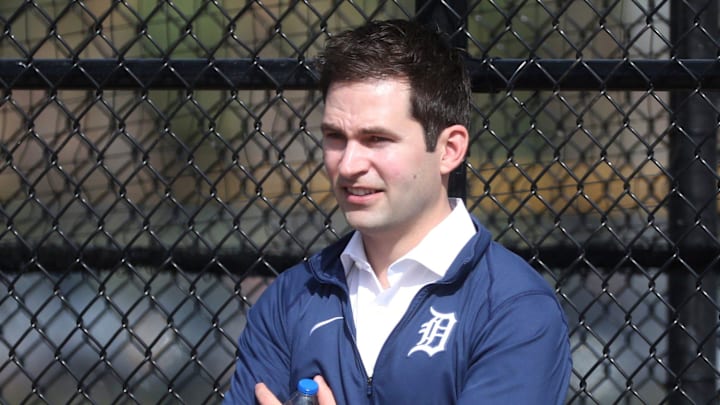Call me skeptical when it comes to the Detroit Tigers and positional versatility
If there's one thing A.J. Hinch has loved and raved about since becoming the manager of the Detroit Tigers, it's players having positional versatility. Scott Harris has preached the same thing since taking over as president of baseball operations, especially recently.
Hinch and Harris both spoke to the media at spring training last week, and players playing multiple positions was a topic that came up in both instances. Harris talked about how putting this roster together is like putting puzzle pieces together.
Hinch spoke about it as well, saying that 19-of-31 position players at camp will be playing multiple positions. That's...a lot.
Having utility guys is important. You need to have two or three guys that can play multiple positions. Nobody is going to debate that. But to have more than half your team be composed of players that don't play one specific position? I'm not so sure about that.
The main question that comes up with that is: is it really best for a player to try to learn multiple positions, especially when they have to hit as well? What if a player is already proficient at one position? Does he really need to learn another one?
Take Jonathan Schoop, for example. He always been a solid fielder at second base, but he played Gold Glove-caliber defense a year ago. Taking the shift away may hurt him a bit in that regard, but it probably won't matter much in the grand scheme of things. He has a lengthy track record of being able to play good defense. So why does he need to able to play third base, or even first base again?
A.J. Hinch was asked that very question about whether it's better for a player to master one position or learn multiple. This is what he had to say, via Chris McCosky of The Detroit News (subscription required):
"“I don’t believe we can guarantee that (specializing in one position) will create the best version either,” Hinch said. “I think it’s a great assumption that it brings out the better version of a player but I’m not sure I agree with the premise.”"A.J. Hinch
A.J. is obviously a very forward-thinking individual. He's also pretty good at putting players in the best position to succeed. But I just don't know if I can agree with him on this one.
If a player ends up sticking at one position, they can eventually excel at it, therefore increasing their overall value. There's a reason Nolan Arenado is good for 5 or 6 WAR every year. It's because he's an elite third baseman in addition to being a great hitter.
Some players also don't like being thrown all around the diamond. Nick Castellanos was a perfect example of this during his time in Detroit. He wasn't very good defensively anywhere the Tigers put him, but he was a good hitter, so they had to find somewhere he could play. He didn't really appreciate being moved everywhere.
A more current, but a bit of a different example of this is Matt Vierling, acquired in the Gregory Soto trade last month. He's an outfielder by trade, but the Tigers plan on moving him around a lot. Contrary to Castellanos, he actually seems excited about it. From the same Detroit New story linked above:
"“I’ve noticed that getting more infield work and doing stuff on the infield allows me to be better in the outfield,” Vierling said. “You can take qualities from each and apply them to both. The more I do infield stuff, the better I am in the outfield — like seeing the ball, anticipating, my glove work. “I really enjoy it.”"Matt Vierling
Good for Vierling. I'm happy that it's working for him, and it is worth noting that he played six different positions with the Phillies last year. But it's still worth wondering if playing multiple positions is right for him.
Vierling is a superb athlete. He ranked in the 97th percentile in sprint speed according to Baseball Savant. The guy can fly. If they stuck him in an outfield spot and let him work at it for a couple years, he could become an elite defender out there, especially in a spacious Comerica Park.
I'm all for positional versatility—to a point. This seems like a bit of overkill to me. It just seems like galaxy brain stuff more than anything. Hinch and Harris are obviously both very smart guys, but I'm worried they might be too smart for their own good here.
I'm willing to let this play out, but needless to say, I have my doubts about all of this positional versatility talk.
